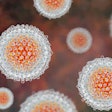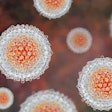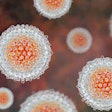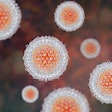
University of Florida scientists have used artificial intelligence (AI) tools to simplify the development of high-quality tests for both hepatitis C and COVID-19.
The research, funded by National Institutes of Health (NIH)’s National Institute of Allergy and Infectious Diseases and published Monday in the journal Cell Reports Medicine, could bring these tests to doctors’ offices and eventually to patients’ homes, according to the scientists.
To accomplish this, the team worked on a one-pot reaction system, in which the entire test happens in one small test tube. These tests, based on RT-LAMP technology, amplify small portions of a virus’s genome and produce a visible signal when they detect a given virus; reading these tests can be as simple as looking for the color blue.
The University of Florida scientists set out to solve some unmet needs with infectious disease diagnosis. Hepatitis C can progress to chronic lifelong infection if left untreated, leading to liver damage and even death. Similarly, timely COVID-19 antiviral treatment can prevent serious illness in high-risk populations. The U.S. Food and Drug Administration (FDA) has granted emergency use authorizations for several at-home COVID-19 test kits. While these tests provide results quickly, many of them need to provide better performance.
The researchers sought to build a home-based test that was as reliable as a lab-based test and would provide quick results while also eliminating the need for expensive equipment.
They combined their RT-LAMP technology with CRISPR for gene editing. They hypothesized that a CRISPR system’s ability to home in on particular genetic sequences might enable the tests to better distinguish between false positives and true positives — for example, only showing a positive result if the hepatitis virus sequence was actually present.
However, RT-LAMP technology requires a temperature of 150° F, while CRISPR works best at 100° F. Tests that combine RT-LAMP and CRISPR would require two separate reactions, which is too complicated for at-home use. The team attempted to bridge this gap by developing a CRISPR system that could withstand higher temperatures.
From a heat-loving bacteria species, the researchers derived a CRISPR enzyme that thrives at 140° F. They used artificial intelligence (AI) tools to analyze this enzyme and discover how they could make it survive at 150° F. The AI program suggested a few dozen changes to the enzyme, all of which the team tested in the lab. They eventually made four changes that allowed the enzyme to work at 150° F.
With everything working at the same temperature, they were able to combine all the elements in a true one-pot reaction. The team verified their simplified test on clinical samples from patients with hepatitis C or COVID-19. The test provided rapid results that were 97% accurate for SARS-CoV-2 and 95% accurate for the most prevalent version of the hepatitis C virus found globally.
The researchers said they foresee progressing beyond home pregnancy and COVID-19 tests to home tests that allow a variety of viruses to be identified early, when treatments work best.



















